中考英语78个易混易错单词+短语+句型(全)
人教部编版初中英语中考78个易混易错单词短语句型梳理
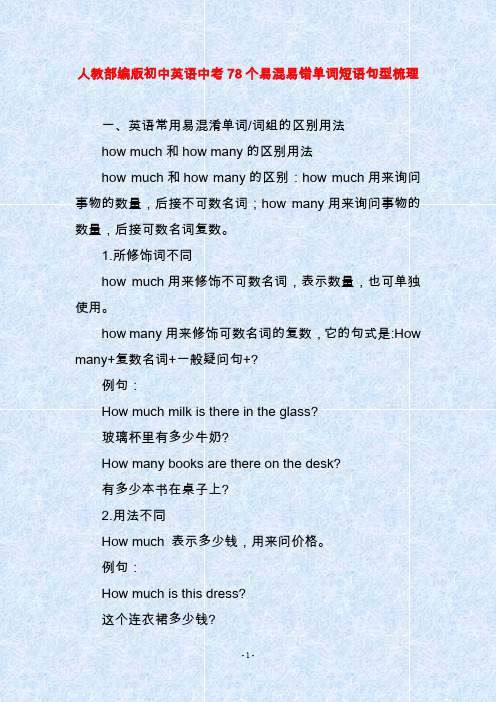
人教部编版初中英语中考78个易混易错单词短语句型梳理一、英语常用易混淆单词/词组的区别用法how much和how many的区别用法how much和how many的区别:how much用来询问事物的数量,后接不可数名词;how many用来询问事物的数量,后接可数名词复数。
1.所修饰词不同how much用来修饰不可数名词,表示数量,也可单独使用。
how many用来修饰可数名词的复数,它的句式是:How many+复数名词+一般疑问句+?例句:How much milk is there in the glass?玻璃杯里有多少牛奶?How many books are there on the desk?有多少本书在桌子上?2.用法不同How much 表示多少钱,用来问价格。
例句:How much is this dress?这个连衣裙多少钱?How many 表示多少,用来问数量。
例句:How many apples do you have?你有多少苹果?in和on的区别用法当我们表示某些东西被其他东西所包围时使用“in”这个词。
而“on”用于描述物体被放置在其他物体上方或外部的情况。
in可表时间,表地点,表手段、方法、材料。
on表示时间、地点、方位等。
1.意思不同in:prep.在 ... 里;在 ... 地方;在 ... 期间on:prep.在 ... 之上2.用法不同in:in着重一段时间的过程,常用于重复动作或延续动作。
in表示从现在时间算起推移到将来的一段时间之后,一般与将来时态连用。
例句:He is a layman in economics.他对经济学一窍不通。
on:表示“在物体的表面上”,只能用on的表达方式有on the next morning,on the following。
例句:The spider is walking on the ceiling.蜘蛛在天花板上爬行。
[全]人教版七八九年级英语常考易混短语
![[全]人教版七八九年级英语常考易混短语](https://img.taocdn.com/s3/m/768d12910722192e4436f654.png)
人教版七八九年级英语常考易混短语一.make的短语1. make friends 结交朋友2. make a wish 许愿3. make (one’s)bed 铺床4. Make up 编造故事,编造谎言5. Make sure 确保,查明6.Make promises 许诺7.Make (a lot of ) money 赚许多钱8.Make mistakes 犯错误9.Make a difference 影响,起作用10.make one’s way 前进;费力地前进11.make one’s own decision 自己做决定12.make an effort 做出努力13.make......feel at home 使某人感到宾至如归14.make a mess 弄得一团糟(一塌糊涂)二.take1. take a shower 洗淋浴2.take a walk 散步;走一走3.take the train/bus 乘火车/公共汽车4.take a message 捎个口信,传话5.take a photo of 给。
照相6. take one’s order 点菜7.Take ......seriously 认真对待8.Take sb’s place 代替,替换9.Take up (尤指为消遣)学着做,开始做10.Take out 拿出,带出11.Take a trip 去旅行12.Take one’s temperature 量体温13.Take breaks (take a break) 休息14.Take risks(take a risk) 冒险15.Take after (外貌或行为)像16.take out the rubbish 倒垃圾17.Take care of 照顾,处理18.take in 吸入,吞入(体内)19.take down 拆除,往下拽,记录20.take notes 记笔记21.take pride in 为。
初中英语2024届中考复习常考易混单词和短语
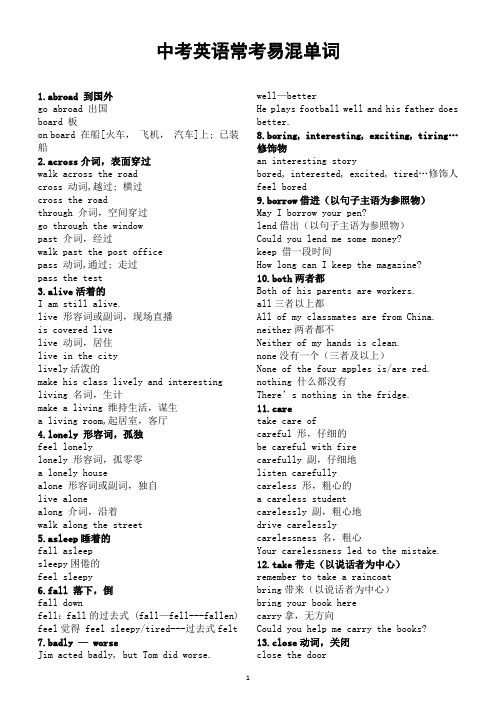
中考英语常考易混单词1.abroad 到国外go abroad 出国board 板on board 在船[火车,飞机,汽车]上; 已装船2.across介词,表面穿过walk across the roadcross 动词,越过; 横过cross the roadthrough 介词,空间穿过go through the windowpast 介词,经过walk past the post officepass 动词,通过; 走过pass the test3.alive活着的I am still alive.live 形容词或副词,现场直播is covered livelive 动词,居住live in the citylively活泼的make his class lively and interesting living 名词,生计make a living 维持生活,谋生a living room,起居室,客厅4.lonely 形容词,孤独feel lonelylonely 形容词,孤零零a lonely housealone 形容词或副词,独自live alonealong 介词,沿着walk along the street5.asleep睡着的fall asleepsleepy困倦的feel sleepy6.fall 落下,倒fall downfell:fall的过去式 (fall—fell---fallen) feel觉得 feel sleepy/tired---过去式felt 7.badly — worseJim acted badly, but Tom did worse. well—betterHe plays football well and his father does better.8.boring, interesting, exciting, tiring…修饰物an interesting storybored, interested, excited, tired…修饰人feel bored9.borrow借进(以句子主语为参照物)May I borrow your pen?lend借出(以句子主语为参照物)Could you lend me some money?keep 借一段时间How long can I keep the magazine?10.both两者都Both of his parents are workers.all三者以上都All of my classmates are from China. neither两者都不Neither of my hands is clean.none没有一个(三者及以上)None of the four apples is/are red. nothing 什么都没有There’s nothi ng in the fridge.11.caretake care ofcareful 形,仔细的be careful with firecarefully 副,仔细地listen carefullycareless 形,粗心的a careless studentcarelessly 副,粗心地drive carelesslycarelessness 名,粗心Your carelessness led to the mistake. 12.take带走(以说话者为中心)remember to take a raincoatbring带来(以说话者为中心)bring your book herecarry拿,无方向Could you help me carry the books?13.close动词,关闭close the doorclose 形容词,亲密的my closest friendclosed形,关着的keep the door closed14.closely副,密切地work closely with us15.brave形,勇敢的He is brave enough to save the old man. courage 名,勇气have the courage to tell him the bad news bravely 副,勇敢地face the difficulties bravely16.dead形容词,死的have been deaddie动,死亡die of hungerdeath名,死亡the death of his pet makes him so sad. 17.especially副,尤其He is good at all subjects, especially maths.specially副,专门The pen is specially designed for the boy. special形,特殊的a special day18.except除了All the students except Tom will go for a school trip.expect期待You are expected to bring it back when you return.19.excited形,激动的,修饰人feel excitedexciting形,激动人心的,修饰物an exciting filmexcitedly 副词,修饰动画shouted excitedlyexcitement名词shout with excitement20.a little一些,修饰不可数名词a little moneya few一些,修饰可数名词a few treeslittle几乎没有,修饰不可数名词There’s little water in the glass, is it? few几乎没有,修饰可数名词so few students21.form 形成form a good reading habitfrom 从……22.France法国/ French 法语German德国的/ Germany 德国23.hard努力work hardhardly几乎不The boy hardly does his homework.24.healthy健康的keep healthyhealth健康it’s good for your healthhealthily健康地eat healthily25.if如果主将从现If he comes, I’ll call you.是否I don’t know if he will come here. whether是否(如与or连用,则用)I wonder whether he’ll come or not. weather 天气What will the weather be like tomorrow?26.include 动词,包括The list includes the names of many famous writers.including 介词,包括They have many pets, including three cats.27.invent动词发明Edison invented a lot of things. invention名词发明The invention made much difference to humans.inventor名词发明者Edison was a great inventor.st 上一个的last year;最后的make her last apperance动词,持续The meeting will last one and a half hours. lasting 形,持久的a lasting value29.lie名词,谎言tell a lie动词,说谎He is always lying to us.动词,位于Japan lies to the east of China.动词,躺,平放He likes lying on the grass.躺,平放;位于:lie—lay---lain说谎:lie-lied-lied30.luck名,运气good lucklucky 形,幸运的a lucky numberluckily 副,幸运的是Luckily, we got better marks.unlucky/unluckily31.noise名,噪音Don’t make any noise.noisy 形,吵闹的much too noisynoisily 副,吵闹地talk noisily32.noise 名词,噪音sound 名词,声音We sat listening to the sound of the waves sound 动词,听起来The music sounds beautiful.voice 名词,嗓音The singer has a sweet voice.33.provide提供provide a chance for the boy=provide the boy with a chanceoffer 提供offer a chance to the boy=offer the boy a chance34.other别的,加名词other studentsanother另一个I don’t like the pair of shoes, would you like to show me another pair?the other 两个中的另一个,常用one…the otherHere is a shoe, where’s the other one? others= other+名词35.over/ under年龄的上下above/ below温度,楼层的上下36.peace名词,和平love peacepeaceful形,宁静的a peaceful villagepeacefully 副,和平地we hope to solve the problem peacefully.37.pleasure名,乐意。
中考英语语法易错易混知识点

中考英语语法易错易混知识点一、可数名词与不可数名词1.可数名词表示能够用数目表示的名词,常常可以用单数或复数形式来表示,其前可以加"a"或"an"。
例句:I have a book.(单数)/ I have two books.(复数)2.不可数名词表示不能用数目清楚地表示的名词,只能用单数形式,前面不能加"a"或"an"。
例句:I have some milk.(不可数名词)二、形容词与副词1.形容词修饰名词,用来描述或限定名词。
形容词通常放在名词的前面。
例句:She is a beautiful girl.2.副词用来修饰动词、形容词或其他副词,通常放在被修饰词的后面。
例句:He runs fast.三、一般现在时与现在进行时1.一般现在时表示经常性或习惯性的动作,叙述真理或客观事实。
例句:The sun rises in the east.(真理)/ He often plays soccer on weekends.(习惯性动作)2.现在进行时表示现在正在进行的动作。
例句:I am watching TV now.(正在进行的动作)四、一般过去时与过去进行时1.一般过去时表示已经结束的过去的动作。
例句:I finished my homework yesterday.(过去的动作已经完成)2.过去进行时表示过去其中一时刻正在进行的动作。
例句:They were playing basketball at 7 o'clock yesterday evening.(过去其中一时刻正在进行的动作)五、定冠词与不定冠词1.定冠词"the"用来特指已经提到过或可唯一确定的名词。
例句:I saw the boy in the park.(特指已经提到的男孩)2.不定冠词"a"或"an"用来表示泛指或不特指的名词。
中考英语重点易混淆短语总结精华(推荐)
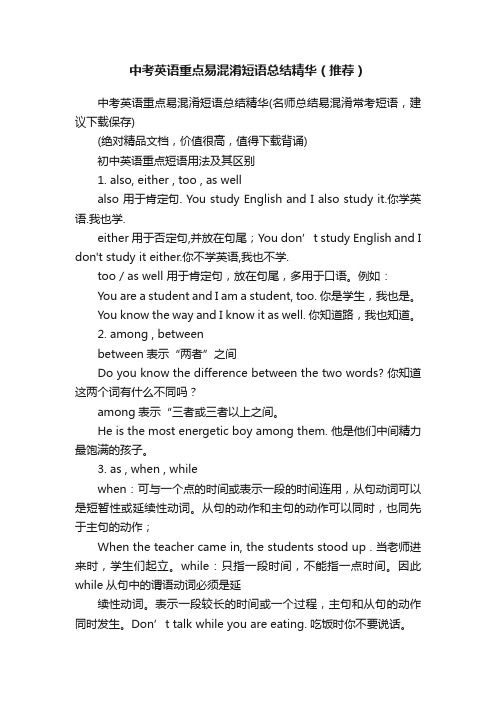
中考英语重点易混淆短语总结精华(推荐)中考英语重点易混淆短语总结精华(名师总结易混淆常考短语,建议下载保存)(绝对精品文档,价值很高,值得下载背诵)初中英语重点短语用法及其区别1. also, either , too , as wellalso 用于肯定句. You study English and I also study it.你学英语.我也学.either 用于否定句,并放在句尾;You don’t study English and I don't study it either.你不学英语,我也不学.too / as well 用于肯定句,放在句尾,多用于口语。
例如:You are a student and I am a student, too. 你是学生,我也是。
You know the way and I know it as well. 你知道路,我也知道。
2. among , betweenbetween表示“两者”之间Do you know the difference between the two words? 你知道这两个词有什么不同吗?among表示“三者或三者以上之间。
He is the most energetic boy among them. 他是他们中间精力最饱满的孩子。
3. as , when , whilewhen:可与一个点的时间或表示一段的时间连用,从句动词可以是短暂性或延续性动词。
从句的动作和主句的动作可以同时,也同先于主句的动作;When the teacher came in, the students stood up . 当老师进来时,学生们起立。
while:只指一段时间,不能指一点时间。
因此while从句中的谓语动词必须是延续性动词。
表示一段较长的时间或一个过程,主句和从句的动作同时发生。
Don’t talk while you are eating. 吃饭时你不要说话。
初中英语易错词汇

初中英语易错词汇1.affect 和effect:常被误用。
affect是动词,意为“影响”;effect是名词,意为“效果”或“影响”。
2.advice 和advise:advice是名词,意为“建议”;advise是动词,意为“建议”。
3.between 和among:between用于两者之间,among用于三者或三者以上之间。
4.borrow 和lend:borrow意为“借入”,lend意为“借出”。
5.bring 和take:bring意为“带来”,take意为“带走”。
6.can 和may:can表示能力或可能性,may表示许可或可能。
7.few 和little:few修饰可数名词,little修饰不可数名词。
8.healthy 和healthily:healthy是形容词,healthily是副词。
9.its 和it's:its是形容词性物主代词,it's是it is的缩写。
10.know 和knew:know是现在时,knew是过去时。
11.lie 和lay:lie是不及物动词,意为“躺”;lay是及物动词,意为“放置”。
12.lose 和miss:lose意为“丢失”,miss意为“想念”或“错过”。
13.noise 和voice:noise是噪音,voice是人的声音。
14.pass 和past:pass是动词,past是介词或副词。
15.problem 和question:problem指需要解决的问题,question指问题或疑问。
16.quiet 和quite:quiet是形容词,意为“安静的”;quite是副词,意为“非常”。
17.receive 和accept:receive指收到,accept指接受。
18.say 和speak:say强调说话内容,speak强调说话动作。
19.since 和for:since与时间点连用,for与时间段连用。
20.some time 和sometime:some time表示一段时间,sometime表示某个时候。
中考易混淆单词
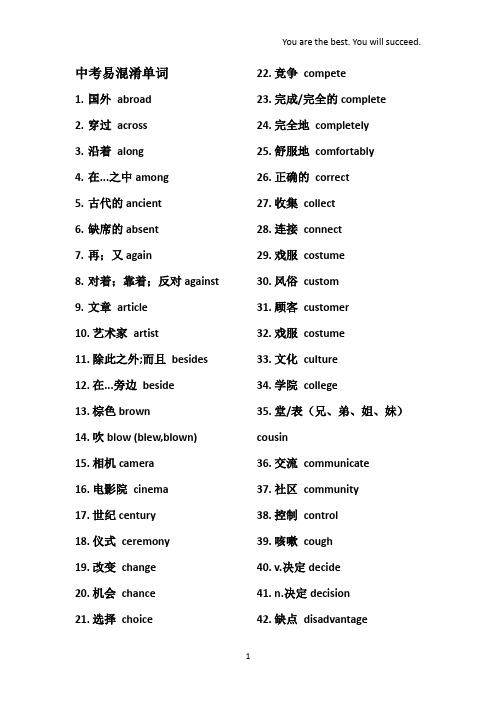
You are the best. You will succeed.中考易混淆单词1.国外abroad2.穿过across3.沿着along4.在...之中among5.古代的ancient6.缺席的absent7.再;又again8.对着;靠着;反对against9.文章article10.艺术家artist11.除此之外;而且besides12.在...旁边beside13.棕色brown14.吹blow (blew,blown)15.相机camera16.电影院cinema17.世纪century18.仪式ceremony19.改变change20.机会chance21.选择choice 22.竞争compete23.完成/完全的complete24.完全地completely25.舒服地comfortably26.正确的correct27.收集collect28.连接connect29.戏服costume30.风俗custom31.顾客customer32.戏服costume33.文化culture34.学院college35.堂/表(兄、弟、姐、妹)cousin36.交流communicate37.社区community38.控制control39.咳嗽cough40.v.决定decide41.n.决定decision42.缺点disadvantageYou are the best. You will succeed.43.挖dig(dug, dug)44.邀请invite45.发明invent46.邀请invitation47.发明invention48.分开divide49.电electricity50.电的electric51.电子的elcetronic52.实验experiment53.经验;经历experience54.尤其;特别especially55.确切地exactly56.极好的;优秀的excellent57.除了except58.期望expect59.表达express60.表现behave61.表扬perform62.渔夫fisherman63.第四fourth64.十四fourteen 65.第四十fortieth66.法语/法国人的French67.法国France68.外国人foreigner69.花园garden70.地理geography71.毕业graduate72.逐渐地gradually73.大体的general74.客人guest75.门卫;士兵guard76.导游guide77.德语/德国人的German78.德国Germany79.习惯habit80.爱好hobby81.幽默的humorous82.高度height83.重量weight84.加热heat85.心脏heart86.拥抱hug(hugged,hugged)87.隐藏hide(hid,hidden)88.放;下(蛋)lay( laid, laid)89.躺lie (lay, lain)90.撒谎(lied,lied)91.邀请invite92.发明invent93.产业;工业industry94.面试;采访interview95.介绍introduction96.指示;指令instruction97.立刻immediately98.日语/日本人的Japanese99.模型model100.中间的middle101.嘴巴mouth102.月month103.老鼠mouse104.钱money105.猴子monkey106.奖牌medal107.铁的metal108.精神上的mental 109.医学的medical110.药medicine111.机器machine112.材料material113.第九ninth114.九十ninety115.(两者)都不neither 116.(三者以上)都不none 117.第九十ninetieth 118.乘客passenger119.段落/走廊passage 120.合适地properly121.可能地possibly122.可能地probably123.承诺promise124.产品product125.英镑pound126.骄傲的proud127.骄傲n. pride128.小学生pupil129.紫色purple130.价格price131.奖品prize132.表扬;赞扬praise 133.星球planet134.种植/植物plant 135.荣幸;快乐pleasure 136.完美的perfect 137.耐心的patient 138.有礼貌的polite 139.飞行员pilot140.准备prepare 141.更喜欢prefer 142.预防prevent 143.保护protect144.污染pollute145.生产v. produce 146.过程n.process 147.十分quite148.安静的quiet 149.收到receive150.意识到realize 151.提醒remind152.复习,回顾review 153.害怕的(形容人)scared 154.害怕的(形容物)scary 155.酸的sour156.咸的salty157.糖sugar158.卖;销售n.sale159.卖;销售V.sell160.v.服务serve161.n.服务service162.n.仆人servant163.围巾scarf164.分离separate165.小吃,零食snack 166.蛇snake167.标准standard168.严格的strict169.严肃的,认真的serious 170.象征symbol171.标志sign172.社会society173.社会的social174.偷steal(stole, stolen)175.摇晃shake(shook,shaken) 176.传播spread177.速度speed178.猜想;设想suppose 179.支持support180.建议suggest181.成功v.succeed182.成功n.success183.通过through184.虽然though/although 185.扔throw (threw, thrown) 186.周二Tuesday187.周四Thursday188.十三thirteen189.三十thirty190.十二twelve191.第十二twelfth192.朝;向toward(s)=to 193.向前forward194.厕所toilet195.珍宝treasure196.雨伞umbrella 197.大学university 198.参观者visitor 199.视频;录像video 200.周三Wednesday 201.天气weather 202.是否whether。
人教版九年级全册英语易错单词大汇总及练习(含答案)(背诵版+默写版)

初三英语易错单词大汇总(背诵版)1.except (除了)2.expect (期待)3.expert (专家)4.accept(接受)1.beside(旁边)2.besides (除此之外)1.quiet(安静)2.quite (十分,非常)1.catch-caught (抓住)2.teach-taught (教)1.true—truly (真的的)fortable—comfortably(舒服的)3.terrible---terribly (可怕的)1.polite---politely(有礼貌的) impolite (没礼貌)plete—completely(完全的)1.nine—nineteen(十九)---ninety(九十)----ninth(第九)2.four---fourteen(十四)----forty (四十)1.twelve---twelfth (十二)2.twenty---twentieth (二十)1.garden (花园) 2.pardon (请原谅,再说一遍)e true (实现)2.in the future (在未来)1.desert (沙漠)2.dessert (甜品)1.habit (习惯)2.hobby(兴趣)1.hundred (百)2.thousand (千)lion(百万)4.billion(十亿)1.friend (朋友)2.foreign (外国的)3.field (田野)1.invent(发明)2.invite (邀请)1.dollar (美元)2.similar (相似)3.familiar(相似)1.though = although (尽管)2.through (通过)3.thought(think的过去式)1.throw ---threw---thrown (扔)2.lie----lay----lain(躺,位于)3.lie---lied ---lied(说谎)y ---laid----laid (放,产卵)1.till (直到)2.not-----until(直到-----才)3.unless (除非)1.argue(争吵,动词)---argument(争吵,名词)1.delicious (美味的)2.travel (旅行)3.thief--thieves (小偷)1.one---first (第一)2.three –third (第三)3.girls (女孩)1.mouth(嘴巴)2.month----months (月份)3.mouse—mice (老鼠) 1.plan---planned (双写)2.prefer----preferred (双写)3.stop-stopped(双写)1.eat---eating(不双写)2.rain---raining(不双写)3.wait-waiting(不双写)4.happen----happened 、happening(不双写)5.write-wrote-written(双写)-writing(不双写)1.expensive----inexpensive2.like ---dislike(不喜欢) ----unlike(不像)1.honest---dishonest(不诚实)2.appear---disappear(消失)1. modern (现代化的)2.model(模型)1.medicine (药)2.machine(机器)1.pride (骄傲,名词)2.proud (自豪的,形容词)3.pound (英镑)1.weather (天气)2.whether(是否)1.father(父亲)2.farther (far的比较级,更远的)3.further(进一步,更深入)1.believe (相信)2.receive (收到)1. succeed (成功,动词)-----success(名词)-successful(形容词) 1.before (之前)2.pass (动词通过)3.past(介词,经过一般用于动词后,如:walk past)初三英语易错单词大汇总(默写版)1_________ (除了)2.__________(期待)3. _________(专家)4. _________(接受)1. _________(旁边)2. _________ (除此之外)1. _________(安静)2. _________ (十分,非常)1.catch-_________ 过去式(抓住)2.teach-_________过去式(教)1.true—_________ 副词(真的)fortable—_________(舒服的)3.terrible---_________ (可怕的)1.polite--_________ (有礼貌的) _________ (没礼貌)plete—_________(完全的)1.nine—_________ (十九)-- _________(九十)--_________ (第九)2.four--_________ (十四)-- _________(四十)1.twelve---_________(十二)2.twenty---_________ (二十)1. _________ (花园)2. _________(请原谅,再说一遍)e _________ (实现)2.in the_________ (在未来)1. _________ (沙漠)2. _________(甜品)1. _________ (习惯)2. _________(兴趣)1. _________ (百)2. _________(千)3. _________(百万)4. _________(十亿)1. _________ (朋友)2. _________(外国的)3. _________(田野)1. _________(发明)2. _________(邀请)1. _________(美元)2. _________(相似)3. _________(相似)1. _________ = _________(尽管)2. _________(通过)3. _________(think的过去式)1.throw --________ --________ (扔)2.lie---_______ -______ (躺,位于)3. lie--______ --______(说谎)y --________ --________(放,产卵)1. _________ (直到)2._________(直到-----才)3. _________(除非)1. _________(争吵,动词)---_________争吵,名词)1. _________ (美味的)2. _________ (旅行)3.thief--_________ (小偷)1.one--_________ (第一)2.three –_________ (第三)3. _________(女孩)1. _________ (嘴巴)2.month---_________ (月份)3.mouse—_________ (老鼠)1.plan---_________ 过去式(双写)2.prefer----_________(双写)3.stop-_________(双写)1.eat--_________现在分词(不双写)2.rain---_________(不双写)3.wait-_________(不双写)4.happen----_________、_________(不双写)1.expensive----________(不贵的)2.like --________ (不喜欢) ----________(不像)1.honest---________(不诚实)2.appear---________ (消失)1. ________(现代化的)2. ________(模型)1. ________ (药)2. ________(机器)1. ________(骄傲,名词)2. ________(自豪的,形容词)3. ________(英镑)1. ________(天气)2. ________(是否)1. ________(父亲)2. ________(far的比较级,更远的)3.________(far的比较级,进一步,更深入)1. ________(相信)2. ________(收到)1. ________ (成功,动词)--- ________(名词)-________ (形容词)1. ________(之前)2. ________ (动词通过)3. ________(介词,经过,一般用于动词后,如:______走过)易错首字母强化训练:1.There are many different kinds of flowers in the g_________.2.Our parents t_________ care for us. They always prepare everything what we need in advance.3.I took lots of wonderful photos with my new c__________.4.E__________ is the mother of wisdom.5.A__________speaks louder than words.6.I beg your ________. What do you mean7.There are so many things around us that go against our w________. We should believe in ourselves and keep on fighting.8.You are supposed to fini sh your homework b________ ten o’clock.9.I used to sit b_________ my mother and enjoyed the stories when I was young.10.Mary can speak three f_________ languages, such as Chinese, French, and German.11.I can’t stand the w________ here, it’s so hot and h umid.12.You’d better change your bad eating h__________. Don’t eat too much fat.13.Today is my t____________ birthday. So eleven candles is not enough , I still need one more.14.The thief was c___________ by the police three years later. And put him into the prison.15.Look , the students are w__________ for the bus. The bus was fiveminutes later than usual.16.Please show me the m_______ plane, It’s quite special, I’m really interested in it.17.My grandma began to learn English in her f________---nearly fifty years old.18.I p_________to go Hongkong for my holiday, but now I have changed my mind. I will go to Thailand instead.19.There are f_______ days in two weeks.20.The people who have realized their mistakes should be e________. 参考答案:1.garden2.truly3.camera4.Experience5.Action6.pardon7.will 8.by/before 9.beside 10.foreign 11.weather 12.habit13.twelfth 14.caught 15.waiting 16.model 17.forties 18.planned 19.fourteen 20.excused。
人教部编版初中英语中考78个易混易错单词短语句型梳理
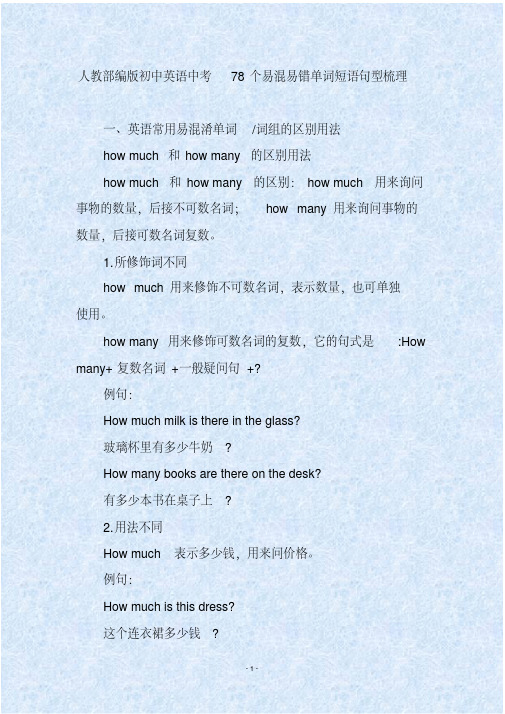
人教部编版初中英语中考78个易混易错单词短语句型梳理一、英语常用易混淆单词/词组的区别用法how much和how many的区别用法how much和how many的区别:how much用来询问事物的数量,后接不可数名词;how many用来询问事物的数量,后接可数名词复数。
1.所修饰词不同how much用来修饰不可数名词,表示数量,也可单独使用。
how many用来修饰可数名词的复数,它的句式是:How many+复数名词+一般疑问句+?例句:How much milk is there in the glass?玻璃杯里有多少牛奶?How many books are there on the desk?有多少本书在桌子上?2.用法不同How much 表示多少钱,用来问价格。
例句:How much is this dress?这个连衣裙多少钱?How many 表示多少,用来问数量。
例句:How many apples do you have?你有多少苹果?in和on的区别用法当我们表示某些东西被其他东西所包围时使用“in”这个词。
而“on”用于描述物体被放置在其他物体上方或外部的情况。
in可表时间,表地点,表手段、方法、材料。
on表示时间、地点、方位等。
1.意思不同in:prep.在 ... 里;在 ... 地方;在 ... 期间on:prep.在 ... 之上2.用法不同in:in着重一段时间的过程,常用于重复动作或延续动作。
in表示从现在时间算起推移到将来的一段时间之后,一般与将来时态连用。
例句:He is a layman in economics.他对经济学一窍不通。
on:表示“在物体的表面上”,只能用on的表达方式有on the next morning,on the following。
例句:The spider is walking on the ceiling.蜘蛛在天花板上爬行。
202X年中考英语78个易混易错单词+短语+句型

202X年中考英语78个易混易错单词+短语+句型1.accept/except: 我接受了他的邀请。
(I accepted his invitation.)2. affect/effect: 这种药会对你的身体产生影响。
(This medicinewill have an effect on your body.)3. advice/advise: 我建议你向他请教。
(I advise you to ask him for advice.)4. allowed/able: 他被允许留下来。
(He is allowed to stay.)5. beside/besides: 我坐在他旁边。
(I sat beside him.)6. busy/business: 他正在忙于工作。
(He is busy with his business.)7. choose/choice: 你可以自由选择。
(You can choose freely.)8. complement/compliment: 你的衣服和你的鞋子相互补充。
(Your clothes complement your shoes.)9. confident/confidential: 这是一份机密文件。
(This is a confidential document.)10. could/would: 他可能会来参加我们的聚会。
(He could/would cometo our party.)11. dessert/desert: 我喜欢吃甜点。
(I like eating desserts.)12. disease/illness: 他患有一种严重的疾病。
(He has a serious illness.)13. effect/affect: 污染对环境有影响。
(Pollution has an effect on the environment.)14. fact/fact: 事实上,我并不了解这个问题。
中考英语易错易混知识点集锦(八)

中考英语易错易混知识点集锦(八)中考英语易错易混知识点集锦(八)1.动词的时态与语态易错易混(1)动词时态一般现在时 (Simple Present Tense):表示经常性的动作、习惯性动作或客观事实等。
一般过去时 (Simple Past Tense):表示过去一些时间发生或完成的动作或状态。
一般将来时 (Simple Future Tense):表示将要发生或将会完成的动作。
现在进行时 (Present Continuous Tense):表示现在正在进行的动作。
过去进行时 (Past Continuous Tense):表示过去一些时间正在进行的动作。
现在完成时 (Present Perfect Tense):表示过去一些时间开始,一直延续到现在,或已完成的动作。
动词语态主动语态 (Active Voice):表示主语是动作的执行者。
被动语态 (Passive Voice):表示主语是动作的承受者。
易错易混知识点:1)动词的时态易错,主要表现在对过去时态和现在完成时态的运用上。
要注意区分过去时态和现在完成时态的区别。
过去时态表示过去一些时间发生或完成的动作,对时间点或时间段有明确的表示;现在完成时态表示过去一些时间开始,一直延续到现在,或已完成的动作,对时间点或时间段没有明确的表示。
2)动词的语态易错,主要表现在对主动语态和被动语态的运用上。
要注意分辨主动语态和被动语态,根据句子的结构和语境进行判断。
主动语态表示主语是动作的执行者,被动语态表示主语是动作的承受者。
2.形容词与副词的比较级与最高级易错易混(1)形容词的比较级与最高级最高级 (Superlative Degree):表示三者或三者以上的最高或最低程度。
易错易混知识点:1) 形容词的比较级与最高级易错,主要表现在形容词比较级和最高级的构成上。
要注意规则的构成和不规则的构成。
一般情况下,一般规则是在形容词后面加-er构成比较级,加-est构成最高级;有些形容词的比较级和最高级是不规则的,需要记住。
初中英语易混易错词汇总结

初中英语易混易错词汇总结初中英语易混易错词汇总结第一部分:易用错的词第一部分:易用错的词1. clothes, cloth, clothingclothes 统指各种衣服,谓语动词永远是复数,统指各种衣服,谓语动词永远是复数, cloth 指布,为不可数名词指布,为不可数名词 clothing 服装的总称,指一件衣服用a piece of, an article of 2. amount, numberamount 后接不可数名词,后接不可数名词, number 后接可数名词后接可数名词 a number of students 3. family, house, homehome 家,包括住处和家人,house 房子,住宅,family 家庭成员. My family is a happy one.4. sound, voice, noise sound 自然界各种各样的声音,voice 人的嗓音,noise 噪音I hate the loud noise outside.5. photo, picture, drawing photo 用照相机拍摄的照片,picture 可指相片,图片,电影片,drawing 画的画画的画 Let's go and see a good picture.6. vocabulary, word vocabulary 词汇,一个人拥有的单词量,word 具体的单词He has a large vocabulary.7. population, people population 人口,人数,people 具体的人具体的人 China has a large population.8. road, street, path, way road 具体的公路,马路,street 街道,path 小路,小径,way 道路,途径道路,途径 take this road; in the street, show me the way to the museum. 9. course, subjectcourse 课程(可包括多门科目),subject 科目(具体的学科)a summer course 10. custom, habitcustom 传统风俗,习俗,也可指生活习惯,后接to do , habit 生活习惯,习惯成自然,后接of doing. I've got the habit of drinking a lot.11. cause, reason cause 指造成某一事实或现象的直接原因,后接of sth./doing sth ,reason 用来解释某种现象或结果的理由,后接for sth./doing sth. the reason for being late 12. exercise, exercises, practice exercise 运动,锻炼(不可数),exercises 练习(可数),practice (反复做的)练习练习 Practice makes perfect.13. class, lesson 作"课"解时,两者可以替换.指课文用lesson.指班级或全体学生用class. lesson 6; class 5 14. speech, talk, lecturespeech 指在公共场所所做的经过准备的较正式的演说,talk 日常生活中的一般的谈话,讲话,lecture 学术性的演讲,讲课学术性的演讲,讲课a series of lecture on… 15. officer, officialofficer 部队的军官,official 政府官员政府官员 an army officer 16. work, job二者均指工作。
中考易错词组英语
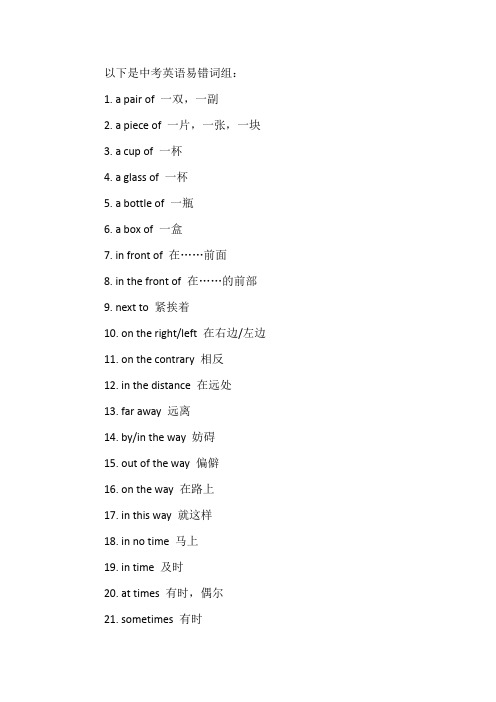
以下是中考英语易错词组:1. a pair of 一双,一副2. a piece of 一片,一张,一块3. a cup of 一杯4. a glass of 一杯5. a bottle of 一瓶6. a box of 一盒7. in front of 在……前面8. in the front of 在……的前部9. next to 紧挨着10. on the right/left 在右边/左边11. on the contrary 相反12. in the distance 在远处13. far away 远离14. by/in the way 妨碍15. out of the way 偏僻16. on the way 在路上17. in this way 就这样18. in no time 马上19. in time 及时20. at times 有时,偶尔21. sometimes 有时22. at the same time 同时23. all the time 一直,始终24. ever since 自从25. from time to time 有时,偶尔26. as usual 像往常一样27. on purpose 故意地28. in order to 为了29. in a hurry 匆忙地30. so far 到目前为止31. in the end 最后,终于32. at last 最后33. at first 起初,首先34. as usual 通常,平常35. after all 毕竟,终究。
36. at once 立刻,马上37. in a minute 一会儿38. little by little 逐渐地,慢慢地39. in the end 最后,终于40. at the same time 同时41. all the time 一直,始终42. ever since 自从43. so far 到目前为止44. as usual 像往常一样45. on purpose 故意地46. in order to 为了47. in a hurry 匆忙地48. on time 准时49. in advance 提前50. on the one hand 一方面51. on the other hand 另一方面52. by the way 顺便说53. as well 也,另外54. as well as 除了,和……一样好55. in addition 另外,又,也56. in general 一般来说,总体上57. after all 毕竟,终究58. in the past 在过去59. now 现在60. later 后来,稍后61. finally 最后,最终62. so far 到目前为止63. up to now 到目前为止64. from then on 从那时起65. in the future 在将来66. lately 最近,不久前67. up to now 到现在为止。
- 1、下载文档前请自行甄别文档内容的完整性,平台不提供额外的编辑、内容补充、找答案等附加服务。
- 2、"仅部分预览"的文档,不可在线预览部分如存在完整性等问题,可反馈申请退款(可完整预览的文档不适用该条件!)。
- 3、如文档侵犯您的权益,请联系客服反馈,我们会尽快为您处理(人工客服工作时间:9:00-18:30)。
中考英语78个易混易错单词+短语+句型一.英语常用易混淆单词/词组的区别用法how much和how many的区别用法how much和how many的区别:how much用来询问事物的数量,后接不可数名词;how many用来询问事物的数量,后接可数名词复数。
1.所修饰词不同how much用来修饰不可数名词,表示数量,也可单独使用。
how many用来修饰可数名词的复数,它的句式是:How many+复数名词+一般疑问句+?例句:How much milk is there in the glass?玻璃杯里有多少牛奶?How many books are there on the desk?有多少本书在桌子上?2.用法不同How much 表示多少钱,用来问价格。
例句:How much is this dress?这个连衣裙多少钱?How many 表示多少,用来问数量。
例句:How many apples do you have?你有多少苹果?in和on的区别用法:当我们表示某些东西被其他东西所包围时使用“in”这个词。
而“on”用于描述物体被放置在其他物体上方或外部的情况。
in可表时间,表地点,表手段、方法、材料。
on表示时间、地点、方位等。
1.意思不同in:prep.在 ... 里;在 ... 地方;在 ... 期间on:prep.在 ... 之上2.用法不同in:in着重一段时间的过程,常用于重复动作或延续动作。
in表示从现在时间算起推移到将来的一段时间之后,一般与将来时态连用。
He is a layman in economics.他对经济学一窍不通。
on:表示“在物体的表面上”,只能用on的表达方式有on the next morning,on the following。
The spider is walking on the ceiling.蜘蛛在天花板上爬行。
3.侧重点不同in:表示“在其中”。
on:表示“在表面”。
if和whether的区别用法:if和whether的区别:if和whether在宾语从句中,都表“是否”,可换用,if更口语化,whether正式些。
当有or not时,一般用whether,而不用if。
1.or not放在whether之后时,只能用whether 不用if。
I don’t know whether or not he will come.我不知道他是不是回来。
注:如果or not放在whether所引导的从句句尾,则可以用if来替换。
I don’t know whether/if he will come or not.我不知道他是不是回来。
2.在强调任意选择时,用whether…or,此时不用if替换whether。
例句:He asked me whether I wanted to go there by train or by bus.他问我是想乘火车还是坐公共汽车去那里。
注:whether和or一起还有“不管”之意,引导让步状语从句。
Whether he drives or takes the train, he will be here on time.不管开车来还是乘火车来,他都会准时到。
3.虽引导宾语从句,但为了强调宾语部分,也可把从句放在句首,此时只用whether不用if。
例句:Whether he will come I am not sure.他是不是来我拿不准。
4.从句作介词宾语时只用whether不用if。
例句:It depends on whether it will be fine.那得看是不是晴天。
5.作discuss等动词的宾语时,用whether不用if。
例句:We discussed whether we should close the shop.我们讨论是不是该关掉商店。
6.句子中有if引导的条件句,如再有表示“是否”的宾语从句,用whether不用if。
例句:He asked me whether I’d move to New York if I got the job.他问我如果我得到那份工作是否会搬家到纽约。
7.容易产生歧义时用whether不用if来表示“是否”。
例句:Please let me know if you need help.如果你需要帮助请告诉我。
8.如果宾语从句为否定句时,则只用if不用whether。
例句:I don’t know if it won't rain tomorrow..我不知道明天是不是会下雨。
or和and的区别用法:并列结构中,or通常用于否定句,and用于肯定句。
但有时and也可用于否定句。
or用于连接并列的单词、词组、短语或句子,表示"或者"的意思。
or用在选择疑问句中,灵活译为"还是"。
1.or和and有什么区别(1)并列结构中,and用于肯定句,or通常用于否定句表示“和,与”之意。
Sue and I left early.我和苏早离开了。
He can't read or write.他不会读,不会写。
(2)or用在选择疑问句中,意为“或者,还是”。
and 不可用于疑问句。
Are you coming or not?你来还是不来?Is your sister older or younger than you?你的姐妹比你大还是小?(3)固定搭配不同or在句型“祈使句+or+陈述句”中,表示在以祈使句为条件下的相反假设,or 意为“否则,要不然”。
either…or意思为"或者……或者……"。
注意谓语动词的主谓一致采用就近原则。
2.and和or用法例句(1)并列结构中,and用于肯定句,or通常用于否定句表示“和,与”之意。
There are some students and teachers on the playground.(2)or用在选择疑问句中,意为“或者,还是”。
Is he a doctor or a teacher? 他是医生还是教师?(3)or在句型“祈使句+or+陈述句”中,表示在以祈使句为条件下的相反假设,or意为“否则,要不然”。
Work hard,or you will fall behind.你要努力学习,否则会落后。
(4)either…or意思为"或者……或者……"。
注意谓语动词的主谓一致采用就近原则。
Either you or I am right. 不是你对,就是我对。
(5)or在“either…or…”结构中,意为“要么……要么……”。
连结的并列成份可在句中作主语、表语、谓语、宾语等。
(6)or表示不确切、模糊的陈述。
This story happened five or six years ago. 这个故事发生在四、五年前。
some和any的区别用法:some和any的区别:肯定句中用some,否定/疑问要用any换some和any的用法:1.some和any都表示一些,两者既可以修饰可数名词又可以修饰不可数名词。
前者用于肯定陈述及委婉请求,后者用于否定句及一般疑问句。
I have some books.I don't have any books.Would you like some coffee?Is there any coffee in your cup?2.在表示建议,反问,请求的疑问句中,或期望得到肯定回答时,多用some而不用any。
Would you like some coffee?What about some fruit juice?3.当说话人认为对方的答复将是肯定的时候,some便可用于疑问句。
例句:Didn't you give him some ticket4.当any表示“任何”的意思,起强调作用时,它可以用在肯定句中。
Any student can answer this question.5.any可以和not以外其他有否定含义的词连用,表达否定的概念。
He never had any regular schooling.I can answer your question without any hesitation.offer与provide的区别用法:offer:主动提供;重点在于主动;offer to do:主动做某事。
搭配:offer sb. sth./ offer sth. to sb.provide:大批量地提供。
搭配:provide sth. for sb./ provide sb. with sth.1.provide和offer的区别:provide 用于表示无主动慷慨之意地为人或物提供需要或有用的东西,仅仅是出于某种责任,强调提供必须或有用的东西,尤其是生活用品。
常用于peovide sb with sth或provide sth for sb的固定搭配中。
offer表示主动提供服务、工作等。
常用于offer sb sth或offer sth to sb的固定搭配。
例如:offer help to sb 主动提出帮助某人;offer sb a good salary 给某人一个好工资。
2.provide和offer的用法:首先在语义上,provide仅表示“提供”,而offer强调“主动提供”。
其次在语法和搭配上,offer后可跟双宾语,而provide后不可跟双宾语最后在搭配上,offer可组成词组offer sb. sth./offer sth. to sb.;provide可组成短语provide sb. with sth./provide sth. for sb.include和contain的区别用法:include与contain两者均可表示“包含”,但有区别:include 的宾语只能是整体中的一部分或是其要素之一,而不能是所谈事物的全体或所有要素。
contain 表示“包含”,其实是指其内装有。
1.include与contain的区别两者均可表示“包含”,但有区别:(1)include的宾语只能是整体中的一部分或是其要素之一,而不能是所谈事物的全体或所有要素。
如:Does the bill include a tip? 账单包括小费在内吗?Five were killed, including a baby. 共有六人死亡,其中有一个婴儿。
(2)contain表示“包含”,其实是指其内装有,即指某种较大的东西内装有较小的东西,其宾语可以是整体的一部分,也可以是其全体。
